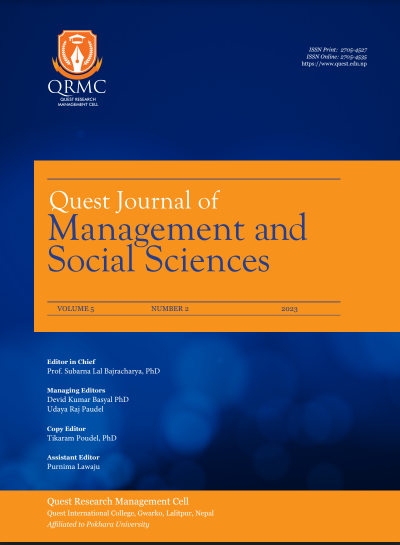Remittances and Happiness: Investigating Socioeconomic Impact of Remittances in Jiri Municipality through Survey Data
DOI:
https://doi.org/10.3126/qjmss.v5i2.60861Keywords:
Migration, Remittance, Living standard, Empowerment, HappinessAbstract
Purpose: In recent years, international migration, notably in economically less developed countries like Nepal, has surged since 1990. Remittances, a vital income source, now constitute a quarter of Nepal's GDP. This research examines their diverse impact on the socioeconomic development of migrant households in Jiri Municipality, Dolakha district. This study tries to address the dimensions such as living standards, education, healthcare, happiness and overall well-being through remittances.
Design/ Methodology: This study used a quantitative approach based on a post-positivist philosophy. Data was collected from 240 respondents, equally divided between remittance-receiving and non-receiving households using structured self-administered questionnaires. A binary logistic regression model was employed to analyse the impact of remittances on various aspects of recipient households, including living standards, education, healthcare, sanitation, empowerment, and overall happiness.
Findings: The study's results indicate that unemployment was the foremost catalyst for migration, followed closely by various poverty-related factors in the study region. Notably, income from remittances exceeded earnings from other sources. The remittances coefficient was highly significant at the 1 per cent level. Furthermore, households receiving remittances demonstrated a significantly greater probability of enjoying improved living standards, enhanced access to quality education, better healthcare and sanitation facilities, increased empowerment, and overall greater happiness than those lacking remittance inflows.
Conclusion: This study highlights remittances' pivotal role in boosting socioeconomic development in Jiri Municipality, Dolakha district. The findings revealed that remittance income surpassing other earnings led to improved living standards, better education, enhanced healthcare, increased empowerment, and greater happiness in recipient households. These findings emphasize remittances' resilience and transformative impact in rural Nepal, highlighting the potential for government initiatives to harness remittances for further local community development.
Research limitations/ implications: This study highlights the resilience of remittances in the study area and reaffirms their constructive role in advancing socioeconomic development within Nepal's rural regions. A detailed study could provide valuable insights to the government for formulating a robust plan to foster remittance-led development in Nepal.
Keywords: Migration, Remittance, Living standard, Empowerment, Happiness
JEL Classification Codes: I3, F24, O1, R5
Downloads
Downloads
Published
How to Cite
Issue
Section
License
Copyright (c) 2023 Quest Journal of Management and Social Sciences

This work is licensed under a Creative Commons Attribution-NonCommercial-NoDerivatives 4.0 International License.
This license enables reusers to copy and distribute the material in any medium or format in unadapted form only, for noncommercial purposes only, and only so long as attribution is given to the creator.




